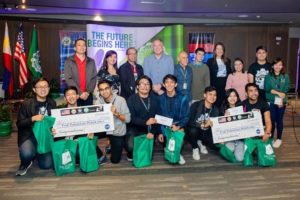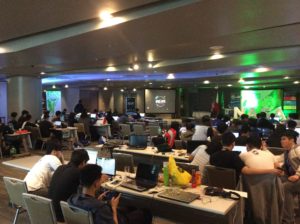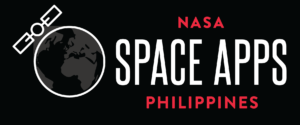MANILA, Philippines — A mobile and SMS application developed by IT professionals Revbrain G. Martin, Marie Jeddah Legaspi, and Julius Czar Torreda to help fishermen receive real-time weather, sunrise and sunset, wind speed, and cloud coverage to plan their fishing activity, and an emergency checklist kit app was developed by students Jeorge Loui P. Delfin, Bluen Ginez, Samuel Jose, Rainier Garcia Narboneta, and Eugenio Emmanuel A. Araullo for disaster preparedness won the NASA Space Apps Challenge on October 19–21 at De La Salle University in Manila, Philippines, in partnership with the Embassy of the United States of America and PLDT.
Other projects and solutions developed are games using images from the Hubble Space Telescope, augmented reality mobile app to tell a story of the changes in the Arctic and Antarctic ice, artificial intelligence app helping scientists confirm the habitability of exoplanets, and story-based game using NASA Earth imagery.
They joined together with teams of coders, scientists, designers, storytellers, makers, builders, technologists, thinkers, designers, entrepreneurs, and everyone around the globe working together in a 48-hour sprint to develop solutions to some of the most pressing challenges on Earth and in space, using NASA resources and data.
Since its inception in 2012, the International Space Apps Challenge has become the world’s largest global hackathon, engaging thousands of global citizens to collaborate in building innovative solutions to complex challenges using NASA’s open data. Hackathons are technology development marathons that draw on the talents and initiative of bright-minded people. Space Apps inspires local innovation communities to convene, cooperate, and create. On 2016, Tzar C. Umang brought Space Apps in Dagupan, Pangasinan while Art Polo Gabriel III, Wilson Censon, and Tito Mari Francis Escaño organized one in PLDT InnoLab in Metro Manila. De La Salle — College of Saint Benilde hosted Space Apps on 2017.
A day-long data bootcamp held on October 19 to learn new concepts, strategies and skills from keynote speakers, panelists and mentors. Michael Carroll from Urban Engine in Huntsville, AL and Dr. Patricia Jacobberger, the Senior Advisor in NASA Earth Science Division, introduced Space Apps through a virtual talk while U.S. Embassy Science Fellow Dr. Anondo Mukherjee and U.S. Fulbright fellow Sarah Marie Hartman gave an online lecture about the Earth’s environment. Acting Director Dr. Joel Joseph S. Marciano, Jr. of DOST-Advanced Science and Technology Institute and Program Leader Dr. Marc Caesar R. Talampas of PHL-Microsat discussed microsatellite development in the Philippines.
Several mentors coming from different backgrounds taught participants in the data bootcamp in the form of stardust stations. Stardust stations is an alternative to a lecture format and encourages learning through participatory activities. A stardust station can show applications of data, demonstrate simple hardware projects or teach other hackathon skills. Neil Patrick Del Gallego and Jordan Deja from De La Salle University taught augmented reality and user experience, respectively. Engr. Ariston N. Gonzalez, Lorenzo Sabug, Jr., Benjamin Joseph D. Jiao, and Carlo Dizon Pastoral from PHL-Microsat discussed using Diwata-1 API. Animo Labs incubatee Simon Gregory Mabanta discuss about educational robotics. John Luis Garcia, Dennis Magsajo, and Randy Bardaje taught using Amazon Web Services cloud. Art Polo Gabriel III, the organizer of Space Apps 2016 from Mobility IT 4 Youth, explained the use cases of smartglass applications.
During the hackathon period on October 20–21, teams are expected to find solutions to themed challenges put forth by NASA. They work together with the rest of the world on hackathon weekend to devise creative and innovative solutions to these challenges. Projects Apps projects don not have to be apps and anyone does not need to become a computer programmer to participate. Participants collaborate to build anything — from open-source software, hardware, data visualizations, and citizen science platforms, to videos, art, and other communications solutions — aimed at addressing global challenges.
The overarching theme of the 2018 challenges is “Earth and Space,” underscoring the connections between major challenges, and the potential solutions to them, both on Earth and in space. The 2018 mainstage Space Apps event was hosted by Urban Engine in the U.S. Space and Rocket Center at Huntsville, AL, also known as “The Rocket City.”
YSEALI alumni Ryan Madrid and Malcolm Flores, Dr. Jasmine Albelda from the Philippine Nuclear Research Institute, entrepreneur Ibba Bernardo, and technologists like Cristopher David and Simon Gregory Mabanta served as mentors in the hackathon proper. IdeaSpace and Animo Labs looked upon promising projects and solutions that might have a business potential. Sentinel Hub, Neustar, Amazon Web Services, Microsoft, and IBM offered the use of their technologies for the participants during the hackathon.
After the development period, teams are expected to provide a four-minute presentation about their projects and solutions. Deputy Chief of Mission John Law of the Embassy of the United States of America to the Philippines, Leandro T. Santos, Head of PLDT Enterprise Core Business Research and Development, Deputy Executive Director Engr. Raul C. Sabularse of DOST-Philippine Council for Industry, Energy and Emerging Technology Research and Development, Senior Planning Officer Yvette M. Cabrera from the Department of Information and Communications Technology, Executive Director Federico C. Gonzalez of Animo Labs served as jurors for the Space Apps hackathon.
Jeanie Duwan, Randolf Mariano, and Xavier Lara from the American Spaces Philippines of the US Embassy and Christine M. Abrigo, Donna Labangon, and Kevin Anthony Kaw from De La Salle University organized Space Apps in the Philippines on 2018. Space Apps Philippines lead organizer Michael Lance believes that Filipinos can build projects and open-source solutions that address real-world problems, on Earth and in space. #SpaceApps #SpaceAppsPH











Comments are closed.